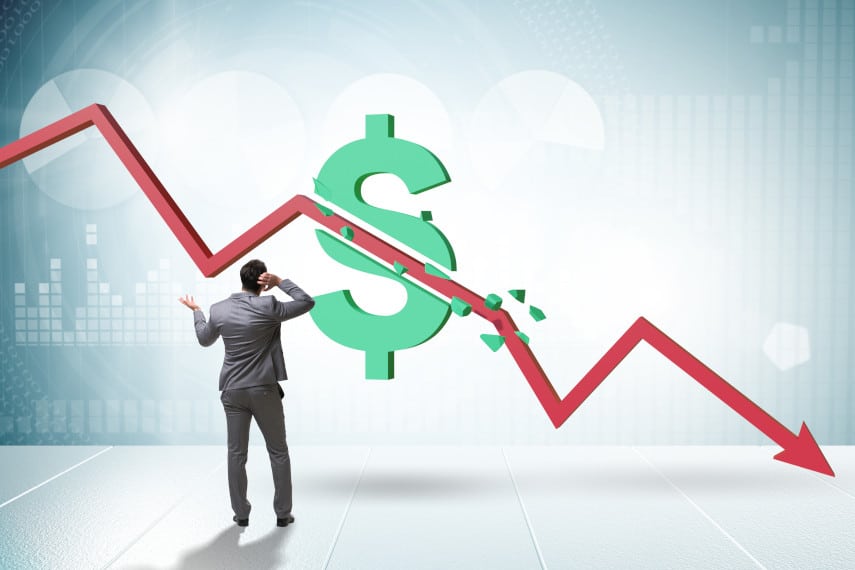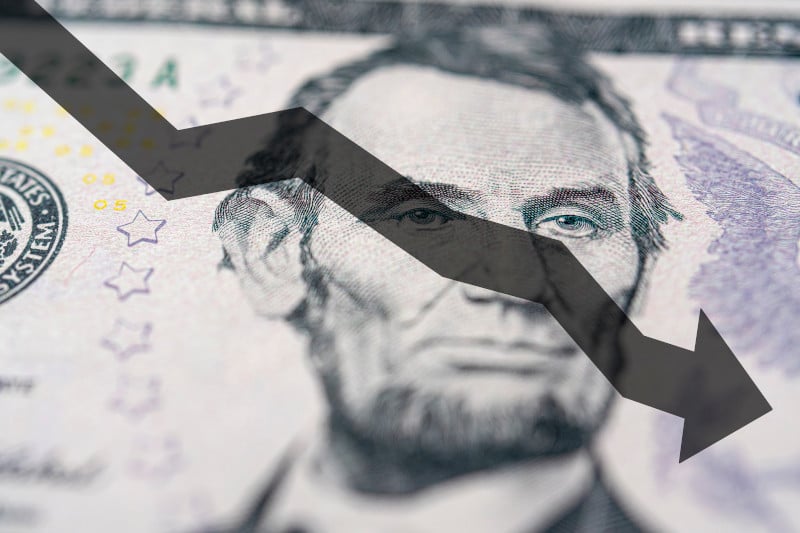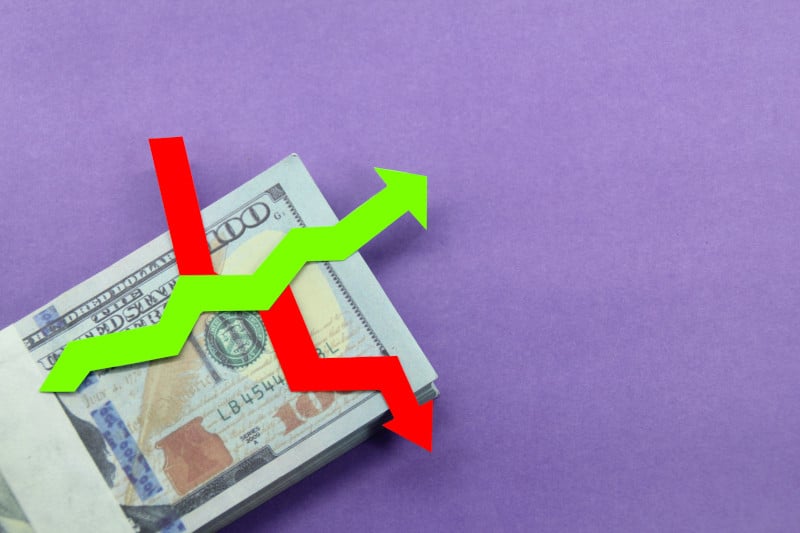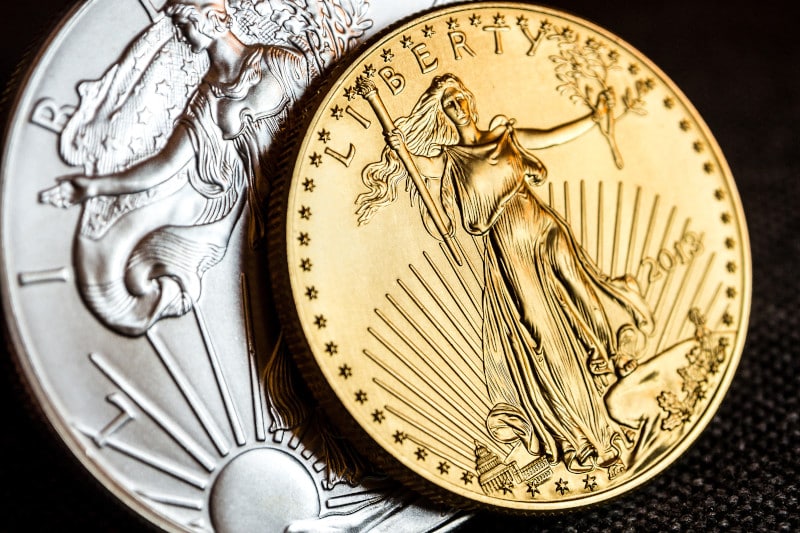
The history of money is the history of failed currencies. From the Roman denarius to the German Goldmark to the Zimbabwean dollar, currencies across the world have collapsed and failed.
Just because a currency is the preferred currency for world trade or the world’s reserve currency does not mean that it is immune from collapse either. And that’s just what could happen to the US dollar.
The US dollar has served as the world’s reserve currency since the end of World War II and the adoption of the Bretton Woods system. Even when that system collapsed in 1971 with President Nixon’s closure of the gold window, the dollar remained the world’s reserve currency.
But with developments in the world economy since the fall of the Berlin Wall and the end of the Cold War, the dollar is facing new threats to its prominent status.
China’s economy continues to grow, and the Chinese government is trying to position the yuan as a rival to the dollar. The European Union created the euro with a mind to compete against the dollar and rival it in international trade.
And since the post-1971 monetary order is the first time in history that the entire world has been on a fiat paper currency system, there’s every possibility that gold or a gold-backed currency could reassert itself in the future after a dollar collapse.
US investors have taken for granted the continued dominance of the US dollar and its status as the world’s reserve currency. It has meant that US investors haven’t had to deal with issues of currency risk that plague investors in other countries.
But it has also made US investors complacent. In the event of a future dollar collapse, millions of investors could find themselves unprepared, unless they take steps to hedge against that possibility.
Key Takeaways
- Debt-fueled spending and inflation is weakening the dollar
- The Federal Reserve’s conduct of monetary policy will be crucial to the dollar’s health
- Owning physical, tangible assets like gold and silver has helped people withstand currency crises

What Could Cause the Dollar to Collapse?
Throughout history, currencies have come and gone, with their demise largely being self-inflicted, the result of the desire of monetary authorities to inflate the money supply to enrich themselves at the expense of others.
During the Roman Empire and other periods of precious metal money, the demise of currencies was the result of purposeful debasement.
The Roman denarius, for instance, saw its silver content decrease over time, going from 95% silver and 5% alloyed metal during the Roman Republic to only 5% silver by the end of the Roman Empire.
Other currencies in history have suffered similar debasement, with modern convertible currencies often seeing governments printing more paper currency units than they had gold backing to redeem.
It was that kind of debasement that dethroned the British pound sterling from its position as the world’s reserve currency after World War I. Today, currency debasement takes the form of creating money out of thin air, something that is easy to do with the ease of creating paper money and electronic bank deposits.
We’re all familiar with the case of Weimar Germany and its hyperinflationary period, in which it took wheelbarrows full of paper money to buy a loaf of bread.
But today the process to inflate currencies doesn’t even take paper. It can all be done electronically, dramatically raising the risks of hyperinflation and a dollar collapse.
The likeliest cause for a US dollar collapse would be if the Federal Reserve were to allow monetary inflation to spiral out of control. And that could be likelier than many people realize.

Will the US Dollar Collapse?
The past few years have seen some incredible moves in monetary policy, starting with the Fed more than doubling the size of its balance sheet from 2020 to 2022. That move alone made the quantitative easing in response to the 2008 financial crisis seem like a drop in the bucket.
Much of that was due to the massive amounts of fiscal stimulus undertaken in 2020, spending which the federal government hadn’t planned on or budgeted for, and which had to be quickly monetized by the Fed in order to absorb such a large issuance of bonds that markets were not prepared to take on.
That debt monetization, however, risked the Fed’s vaunted independence, making the Fed complicit in enabling all of that debt-fueled spending. And if future administrations push the Fed further in that direction, it could risk sending the money supply spiraling out of control, leading to rising inflation and potentially even hyperinflation if the situation gets really bad.
If the dollar ends up being held hostage to out of control federal spending, it could mean significant further devaluation, and eventually a potential collapse of the dollar’s status as the world’s reserve currency and the rise of some other currency as the dominant currency in international trade.
The near vertical moves in the money supply in the recent past were quite worrying, and resulted in inflation that was the highest we had seen in 40 years. But while the Fed has managed to get that under control and bring the money supply down somewhat, that too seems to be coming to an end.
The money supply has been moving very slowly upward over the past year, and the Fed’s recent decision to cut interest rates could result in an eventual expansion of monetary easing that could send the money supply up even further.
A lot is riding on the results of November’s election as well. If Democrats take control of both the White House and Congress, they could unleash even more trillions of dollars of debt-fueled spending, hastening the dollar’s descent towards oblivion.

How to Safeguard Your Finances If the Dollar Collapses
In the case of dollar collapse, the value of anything that depends on the dollar for its value or that is denominated solely in dollars will be at risk of collapse too. Bonds denominated in dollars could become worthless, as bondholders will be paid back in increasingly worthless dollars.
Stocks, too, risk becoming worthless, as even if prices rise, investors who sell their shares see the dollars they receive become worthless as the dollar collapses. If you can’t sell your shares because the dollars you receive won’t be worth anything, what point is there to owning stocks?
In many cases of currency collapse, those who fared the best were those who owned tangible assets that they could sell, trade, or barter. Among those tangible assets that perform well are precious metals such as gold and silver.
Owning physical gold and silver coins or bars can be an effective hedge against dollar collapse, and a way not only to preserve your wealth in the event of a US dollar collapse but even your way of life.
During the Weimar hyperinflation, those who held gold and silver coins, or foreign currencies convertible into gold and silver, were able to weather the hyperinflation period after the currency collapsed, while those who relied on paper Reichsmarks or pension promises found themselves a the mercy of inflationary tides that swept them away.
If the US dollar were ever to collapse, those who own physical gold and silver coins and bars could find themselves positioned to weather the impact of that collapse better than those who rely solely on the dollar’s current value.
The weaker the dollar becomes, the stronger gold and silver should perform. That’s because these precious metals maintain their purchasing power even when the purchasing power of the dollar decreases.
Right now gold is hitting all-time highs and showing no signs of slowing down, while silver is waking up and making an upward run as well. And one way to help put gold and silver to use in safeguarding your assets is through precious metals IRAs.
Whether you’re buying gold through a gold IRA or buying silver through a silver IRA, precious metals IRAs allow you to purchase physical gold or silver coins and bars that you own and control.
When you want to take a distribution from your precious metals IRA, you can take that distribution either in cash or in physical gold or silver. And to fund your gold IRA or silver IRA, you can do a tax-free rollover from your existing retirement accounts.
So if you already have a 401(k), IRA, TSP, or similar retirement account, you can roll over or transfer assets from those accounts into a precious metals IRA, and normally without tax consequences. That gives you the same tax benefits as your existing retirement accounts while simultaneously giving you the benefits of owning physical gold or silver.
Don’t leave your retirement assets at risk of losing value in case of a dollar collapse. Contact the experts at Goldco today to find out how gold and silver can help you preserve your wealth when the dollar gets weaker.
This article was originally published in January 2021 and was updated in September 2024.

